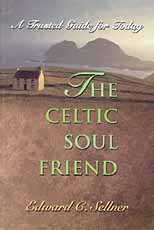Edward Sellner is professor of pastoral theology and spirituality at the College of St. Catherine in St. Paul, Minnesota. For years he has researched and written about Celtic Christianity and visited many sites connected with Celtic saints. This solid and substantive paperback examines the origins, history, meaning, and role of the anamchara (Gaelic for soul friend) as expressed in various pre-Christian and Christian writings.
In a fascinating chapter on the desert fathers and mothers, the author shows how the devotional lives and practices of these Middle Eastern elders influenced the rise of the practice of soul friendship in Celtic lands. John Cassian wrote about the purity of the heart and the ability of spiritual mentors to listen to the secrets of others without judgment: “An evil thought sheds its danger when it is brought into the open . . . Its dangerous promptings hold sway in us as long as these are concealed in the heart.”
Sellner examines the lives of the Celtic saints and the eighth-century reform movement that bolstered the rise of the soul friend ministry. He then outlines the basic elements of the anamchara relationship. It is characterized by great affection, intimacy, and depth. Soul friends have a deep respect for each other’s wisdom and their common values. They are able to challenge each other when it is necessary to do so. Their relationship is centered not on each other but on God. Solitude is viewed as a primary resource for spiritual growth. And, finally, soul friendship is able to survive geographical separation, the passage of time, and even death.
This robust spiritual tradition flourished in the soil of Celtic Christianity where nature was reverenced as a sign of God’s creativity, learning was honored, simplicity and small communities were cherished, and human fragility was acknowledged. The Celtic Soul Friend salutes this rich spiritual practice with enthusiasm and fresh insights.
